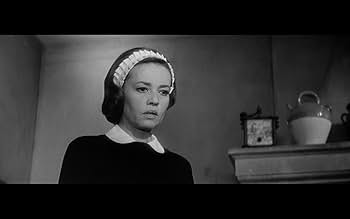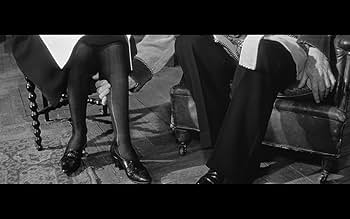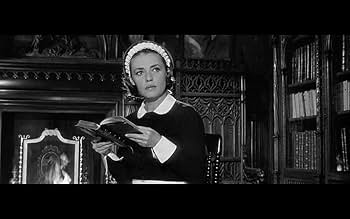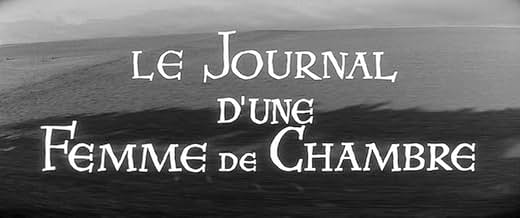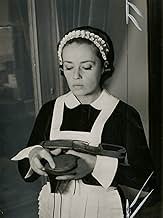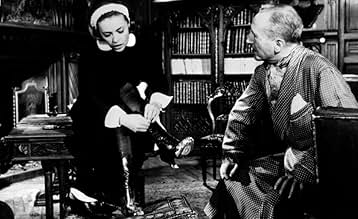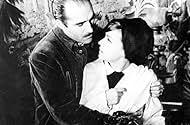IMDb RATING
7.4/10
10K
YOUR RATING
A sophisticated and self-assured woman from Paris joins a middle-class rural estate as a maid and causes quite a stir among the variously uptight, perverse and violent inhabitants.A sophisticated and self-assured woman from Paris joins a middle-class rural estate as a maid and causes quite a stir among the variously uptight, perverse and violent inhabitants.A sophisticated and self-assured woman from Paris joins a middle-class rural estate as a maid and causes quite a stir among the variously uptight, perverse and violent inhabitants.
- Director
- Writers
- Stars
- Awards
- 1 win & 2 nominations total
- Director
- Writers
- All cast & crew
- Production, box office & more at IMDbPro
7.410.2K
1
2
3
4
5
6
7
8
9
10
Featured reviews
Finally a Bunuel film I can make sense of! Oh, nevermind.
This is the most straight-forward film I've seen by the surrealist master Bunuel, and despite its cryptic turn in the final moments, is funny, chilling, and a bit nasty. The story follows an urbane chambermaid from Paris who comes to work at the country estate of a repressed bourgeosie family. She weathers passes from every man in sight and deflects them, but for morally ambiguous reasons. Moral ambiguity is rampant, as it is so often in Bunuel's films, and spread liberally amongst all classes. It's subtly a film about selling out, except that nobody seemed to have any principles to begin with. Good fun. Now tell me what the ending was all about.
DIARY OF A CHAMBERMAID: Comparison between 1946 and 1964 Film Versions
I will say outright that not only is Luis Bunuel my favorite film director but I also consider him one of the ten of the all-time greatest. Rarely did a renowned film-maker make such a remarkable comeback after years of exile as Bunuel did with LOS OLVIDADOS (1950) and, even rarer still, did one director have such a sustained series of masterworks released towards the twilight of his career. Having said all this, however, I think that LE JOURNAL D'UNE FEMME DA CHAMBRE aka DIARY OF A CHAMBERMAID (1964) is the weakest of the final ten feature films Bunuel made during the most fruitful period of his career (between 1961 and 1977) if such a choice were to be made, that is.
Don't get me wrong; I do think that LE JOURNAL is an excellent film and would probably be considered a bona-fide masterpiece if it were made by a lesser director. There is much to enjoy in the film: Jeanne Moreau's superb central performance as the opportunistic Celestine stricken by an unexpected sense of moral duty prompting her to nail the killer of the child even if she has to marry him to do so; Michel Piccoli's hilarious turn as the eternally insatiable but perennially unsatisfied master of the household who, when his sexual advances towards Celestine are turned down by the latter, has to make do with the ugly-looking house-maid; the aged father-in-law who invites Celestine into his room to read for him, all the while indulging in his foot fetish; the sadistic manservant who thinks nothing of violating and murdering innocent little girls while nurturing dreams of sealing his independence with the purchase of a pub all his own and with Celestine as his partner; the eccentric neighbour who sabotages their garden at every turn and yet yearns for Celestine's companionship, etc. Bunuel offers a typically scathing satire of the bourgeoisie here and, as has already been stated by others in this thread, also shows that he is adept at utilizing the widescreen format despite this being his first and only stab at it, as well as imbuing seemingly trivial and innocent sequences with a subtly perverse touch of subversion.
Even so, I do tend to generally agree with eminent film critic Leslie Halliwell's verdict on this particular film: 'Interesting but not especially successful Bunuel version; the subject is certainly up his street but the novel (by Octave Mirbeau) seems to restrict him'. I found the ending incomprehensible and disappointing myself at first but now I can appreciate not only its irony but its audacity. I have now watched the film three times twice on VHS and once on Criterion's DVD and I must say that it does improve with each viewing.
I don't know if anyone of you has seen Jean Renoir's 1946 US film version but somehow I actually prefer it to Bunuel's. I can't say I concur with Halliwell's review this time around dismissing as it did Renoir's film: 'Hollywood notables were all at sea in this wholly artificial and unpersuasive adaptation of a minor classic'! Leonard Maltin, a well-known US film critic, didn't like it much either saying that it was an 'uneasy attempt at a Continental-style romantic comedy tries hard but never really sure of what it wants to be (the cast) do their best to liven things'! Based on these two capsule reviews I was hardly expecting it to be a patch on the Bunuel version but I nevertheless purchased the PAL VHS (issued by 4 Front but subsequently deleted) since it was quite cheap and, after all, medium Renoir (another of my favorites, by the way) is better than many other film-makers around!
But, surprisingly, what could have easily been a inconsequential and frothy comedy of manners (the result of the typically sanitized Hollywood rewrites of subversive European literature) turned out to be an unprecedented black comedy with that uniquely French bleak outlook of things. Paulette Goddard plays Celestine in this one and she has probably never been better. In fact, as was also the case with the later Bunuel adaptation, the performances here are all first-rate: Hurd Hatfield as the idealistic young son who falls hopelessly in love with Celestine; Judith Anderson as the lady of the house firmly in control of every situation but with some strange alliances of her own; Irene Ryan as a timid scullery maid; Reginald Owen as the weak-willed master of the house perpetually harassed by his wife's demands; and particularly Burgess Meredith (who also wrote the screenplay!) as the half-crazed and shell-shocked retired Army Captain who is their neighbor; but especially Francis Lederer whose portrayal of the devilish manservant Joseph lusting after Celestine while scheming behind the back of his oppressive masters is quite chilling.
Doing some more reading on this film after watching it a couple of times, I found out that there are those who think more highly of Renoir's DIARY OF A CHAMBERMAID than I was previously led to believe. In fact, if I'm not mistaken, no less an authority than Andre' Bazin, in his famous unfinished critical study of Renoir's films, goes so far as to call it a masterpiece and the finest of all the films Renoir made in America between 1941 and 1947. Well, who am I to argue? I do recommend that you seek it out if you have the chance if only to see how it compares with the more readily available Bunuel version.
The thing which struck me most when comparing these two film versions is how different the plot-line actually is from one film to the other. I haven't read the book so I can't say which is the more legitimate one but the differences are quite noteworthy: while there is no child murder in the Renoir version, Joseph does get to kill the eccentric neighbor; there is no handsome young master in Bunuel's version; there is no aged patriarch in Renoir's version; Joseph does not survive to see the realization of his dreams in the Renoir version but rather gets himself slightly killed in a climactic fight in the city streets with Celestine's young pretender, etc. I think it would be a worthwhile exercise if I were to get my hands on Octave Mirbeau's original novel some day!
As a matter of fact, I think a similarly fascinating comparison could be made between (incidentally, another favorite director of mine) Josef von Sternberg's final film with Marlene Dietrich, THE DEVIL IS A WOMAN (1935) and Luis Bunuel's cinematic swan song, CET OBSCUR OBJET DU DESIR aka THAT OBSCURE OBJECT OF DESIRE (1977) both of which were adapted from the same source material: Pierre Louys' 'La Femme Et Le Pantin'.
Don't get me wrong; I do think that LE JOURNAL is an excellent film and would probably be considered a bona-fide masterpiece if it were made by a lesser director. There is much to enjoy in the film: Jeanne Moreau's superb central performance as the opportunistic Celestine stricken by an unexpected sense of moral duty prompting her to nail the killer of the child even if she has to marry him to do so; Michel Piccoli's hilarious turn as the eternally insatiable but perennially unsatisfied master of the household who, when his sexual advances towards Celestine are turned down by the latter, has to make do with the ugly-looking house-maid; the aged father-in-law who invites Celestine into his room to read for him, all the while indulging in his foot fetish; the sadistic manservant who thinks nothing of violating and murdering innocent little girls while nurturing dreams of sealing his independence with the purchase of a pub all his own and with Celestine as his partner; the eccentric neighbour who sabotages their garden at every turn and yet yearns for Celestine's companionship, etc. Bunuel offers a typically scathing satire of the bourgeoisie here and, as has already been stated by others in this thread, also shows that he is adept at utilizing the widescreen format despite this being his first and only stab at it, as well as imbuing seemingly trivial and innocent sequences with a subtly perverse touch of subversion.
Even so, I do tend to generally agree with eminent film critic Leslie Halliwell's verdict on this particular film: 'Interesting but not especially successful Bunuel version; the subject is certainly up his street but the novel (by Octave Mirbeau) seems to restrict him'. I found the ending incomprehensible and disappointing myself at first but now I can appreciate not only its irony but its audacity. I have now watched the film three times twice on VHS and once on Criterion's DVD and I must say that it does improve with each viewing.
I don't know if anyone of you has seen Jean Renoir's 1946 US film version but somehow I actually prefer it to Bunuel's. I can't say I concur with Halliwell's review this time around dismissing as it did Renoir's film: 'Hollywood notables were all at sea in this wholly artificial and unpersuasive adaptation of a minor classic'! Leonard Maltin, a well-known US film critic, didn't like it much either saying that it was an 'uneasy attempt at a Continental-style romantic comedy tries hard but never really sure of what it wants to be (the cast) do their best to liven things'! Based on these two capsule reviews I was hardly expecting it to be a patch on the Bunuel version but I nevertheless purchased the PAL VHS (issued by 4 Front but subsequently deleted) since it was quite cheap and, after all, medium Renoir (another of my favorites, by the way) is better than many other film-makers around!
But, surprisingly, what could have easily been a inconsequential and frothy comedy of manners (the result of the typically sanitized Hollywood rewrites of subversive European literature) turned out to be an unprecedented black comedy with that uniquely French bleak outlook of things. Paulette Goddard plays Celestine in this one and she has probably never been better. In fact, as was also the case with the later Bunuel adaptation, the performances here are all first-rate: Hurd Hatfield as the idealistic young son who falls hopelessly in love with Celestine; Judith Anderson as the lady of the house firmly in control of every situation but with some strange alliances of her own; Irene Ryan as a timid scullery maid; Reginald Owen as the weak-willed master of the house perpetually harassed by his wife's demands; and particularly Burgess Meredith (who also wrote the screenplay!) as the half-crazed and shell-shocked retired Army Captain who is their neighbor; but especially Francis Lederer whose portrayal of the devilish manservant Joseph lusting after Celestine while scheming behind the back of his oppressive masters is quite chilling.
Doing some more reading on this film after watching it a couple of times, I found out that there are those who think more highly of Renoir's DIARY OF A CHAMBERMAID than I was previously led to believe. In fact, if I'm not mistaken, no less an authority than Andre' Bazin, in his famous unfinished critical study of Renoir's films, goes so far as to call it a masterpiece and the finest of all the films Renoir made in America between 1941 and 1947. Well, who am I to argue? I do recommend that you seek it out if you have the chance if only to see how it compares with the more readily available Bunuel version.
The thing which struck me most when comparing these two film versions is how different the plot-line actually is from one film to the other. I haven't read the book so I can't say which is the more legitimate one but the differences are quite noteworthy: while there is no child murder in the Renoir version, Joseph does get to kill the eccentric neighbor; there is no handsome young master in Bunuel's version; there is no aged patriarch in Renoir's version; Joseph does not survive to see the realization of his dreams in the Renoir version but rather gets himself slightly killed in a climactic fight in the city streets with Celestine's young pretender, etc. I think it would be a worthwhile exercise if I were to get my hands on Octave Mirbeau's original novel some day!
As a matter of fact, I think a similarly fascinating comparison could be made between (incidentally, another favorite director of mine) Josef von Sternberg's final film with Marlene Dietrich, THE DEVIL IS A WOMAN (1935) and Luis Bunuel's cinematic swan song, CET OBSCUR OBJET DU DESIR aka THAT OBSCURE OBJECT OF DESIRE (1977) both of which were adapted from the same source material: Pierre Louys' 'La Femme Et Le Pantin'.
Fight of Classes, Hypocrisy, Fascism, Clerical and Murder
In the 30's, the witty, literate and quite sophisticated chambermaid Céléstine (Jeanne Moreau) comes from Paris to work for the dysfunctional Monteil family in the country, more specifically for the fetishist on shoes and maniac for cleaning Monsieur Rabour (Jean Ozenne). His daughter and mistress of the house Madame Monteil (Françoise Lugagne) is a frigid and arrogant woman, and her husband, Monsieur Monteil (Michel Piccoli), is a hunter and also a wolf with their maids. Their fascist and rude worker Joseph (Georges Géret) feels a sexual attraction for Céléstine, but she repels him. Their neighbor, Captain Mauger (Daniel Ivernel), has a problem with the Monteils and dumps his garbage in their yard, but Céléstine talks to him and is motive of gossips. When Monsieur Rabour unexpectedly dies, Céléstine quits her job but while in the train station, she finds that the girl Claire was found raped and murdered by the police. Céléstine returns to her job convinced that Joseph killed the little girl and trying to find evidences against him.
"Le Journal d'une Femme de Chambre" is a delightful movie of undefined genre drama, black comedy, adventure? where Luis Buñuel again exposes fight of classes, hypocrisy of both the bourgeois and the working class, a historical moment in France with the fascism growing, the ridiculous role of the clerical and an unsolved murder case. The story is centered in Céléstine, but the motives why a woman with her profile accepts a job in a rural area is never clear. The identity of the rapist and killer of Claire is also not disclosed, there is only a strong insinuation that Joseph killed the girl. The story is very ironic, like for example when Monsieur Monteil is informed that Céléstine and Joseph will marry and requires the sexual favors from Marianne; or the weird fetishism of Monsieur Rabour; or the priest asking for a new roof for the church to Madame Monteil; or the conclusion with Captain Mauger changing his will and serving the mistress and smart Céléstine on their bed. My vote is seven.
Title (Brazil): "O Diário de uma Camareira" ("The Diary of a Chambermaid")
"Le Journal d'une Femme de Chambre" is a delightful movie of undefined genre drama, black comedy, adventure? where Luis Buñuel again exposes fight of classes, hypocrisy of both the bourgeois and the working class, a historical moment in France with the fascism growing, the ridiculous role of the clerical and an unsolved murder case. The story is centered in Céléstine, but the motives why a woman with her profile accepts a job in a rural area is never clear. The identity of the rapist and killer of Claire is also not disclosed, there is only a strong insinuation that Joseph killed the girl. The story is very ironic, like for example when Monsieur Monteil is informed that Céléstine and Joseph will marry and requires the sexual favors from Marianne; or the weird fetishism of Monsieur Rabour; or the priest asking for a new roof for the church to Madame Monteil; or the conclusion with Captain Mauger changing his will and serving the mistress and smart Céléstine on their bed. My vote is seven.
Title (Brazil): "O Diário de uma Camareira" ("The Diary of a Chambermaid")
Minor masterpiece? Quite the opposite!
Luis Buñuel, the man considered Spain's finest filmmaker and revered master of surrealism by both critics and film historians, made a surprising change of style in the first of the series of masterpiece she did in France during his last years. Taking out his usual surrealist set-pieces, he adapts Octave Mirbeau's revered novel about social classes in a very straight-forward fashion. However, this does not mean the movie is bad as many may believe; quite the opposite, "Le Journal d'eune Femme de Chambre" is a perfect showcase of Buñuel's finest film-making style, ambiguous and stylish, like the master's own vision of life.
The plot follows Celestine (Jeanne Moreau), an urban young woman moving to country in 30s France to work as a chambermaid for the Monteils, a rich family with a few dark secrets. As soon as she arrives, problems start as she tries to adapt to her new life with the bizarre Monteils. Between the constant advances of sexually insatiable Monsieur Monteil (Michel Piccoli), the always vigilant eye of his materialist wife (Françoise Lugagne) and the shoe fetish of old Monsieur Rabour (Jean Ozenne); Celestine makes her way through this collection of living portraits of the most bizarre human nature.
With a plot like this it would easy to believe this is a movie where the high class is demonized and the poor sanctified, but this is not the case here. Buñuel makes sure to have an ambiguity in every character, even in Celestine herself. There is no black and white, just different shades of gray, in a way similar to the beautiful black & white photography he uses here.
The photography is essential in this film; not only for aesthetic purposes, it represents the dark decadent days of 30s Europe, and the pessimism latent in both rich and poor people. As I wrote above, the shades of gray match perfectly the ambiguity of a group of characters with as many virtues as flaws. Buñuel and his cast manage to create believable and realistic characters.
Jeanne Moreau gives a brilliant performance as Celestine. As the beautiful young city woman highly intelligent and not without aspirations, her character has enough room to let her shine, and she really makes the most of it. Equally brilliant is Georges Géret as Joseph, the tough gardener with fascist ideals that has a secret agenda. The rest of the cast is also very good and together with the witty script complete a superb character-driven movie.
Buñuel's masterful direction creates a film that, while completely focused on the characters, is still filled with his usual symbolism. The edition and the camera-work are superb and way the camera seems to flow inside the house gives the film a voyeuristic feeling. No wonder why Buñuel consider it a very erotic film.
While many people consider this movie as one of his "lesser works", I consider it to be quite underrated, as it proved that Buñuel was a master not only of surrealism, but of film-making in general. 9/10
The plot follows Celestine (Jeanne Moreau), an urban young woman moving to country in 30s France to work as a chambermaid for the Monteils, a rich family with a few dark secrets. As soon as she arrives, problems start as she tries to adapt to her new life with the bizarre Monteils. Between the constant advances of sexually insatiable Monsieur Monteil (Michel Piccoli), the always vigilant eye of his materialist wife (Françoise Lugagne) and the shoe fetish of old Monsieur Rabour (Jean Ozenne); Celestine makes her way through this collection of living portraits of the most bizarre human nature.
With a plot like this it would easy to believe this is a movie where the high class is demonized and the poor sanctified, but this is not the case here. Buñuel makes sure to have an ambiguity in every character, even in Celestine herself. There is no black and white, just different shades of gray, in a way similar to the beautiful black & white photography he uses here.
The photography is essential in this film; not only for aesthetic purposes, it represents the dark decadent days of 30s Europe, and the pessimism latent in both rich and poor people. As I wrote above, the shades of gray match perfectly the ambiguity of a group of characters with as many virtues as flaws. Buñuel and his cast manage to create believable and realistic characters.
Jeanne Moreau gives a brilliant performance as Celestine. As the beautiful young city woman highly intelligent and not without aspirations, her character has enough room to let her shine, and she really makes the most of it. Equally brilliant is Georges Géret as Joseph, the tough gardener with fascist ideals that has a secret agenda. The rest of the cast is also very good and together with the witty script complete a superb character-driven movie.
Buñuel's masterful direction creates a film that, while completely focused on the characters, is still filled with his usual symbolism. The edition and the camera-work are superb and way the camera seems to flow inside the house gives the film a voyeuristic feeling. No wonder why Buñuel consider it a very erotic film.
While many people consider this movie as one of his "lesser works", I consider it to be quite underrated, as it proved that Buñuel was a master not only of surrealism, but of film-making in general. 9/10
no concessions
The best thing about Bunuel is his ruthless lucidity, and it's thoroughly on display here. All his films start from the conviction that no one is to be pitied - or even if they are, Bunuel, like life, will not oblige, and neither the audience nor the person concerned should expect it of them. Which is not to say that all abuses are right - the film postulates that between fascist and violent criminal there is little difference, and then, true to lucid form, makes it clear at the end that evil does *not* automatically bring about its own destruction; a fact not to be lamented but fought over. Bunuel said he thought it was his most erotic film. It's not an unreasonable claim. There's not a single sex scene. Go figure.
Did you know
- TriviaThis is Luis Buñuel's only film in the anamorphic widescreen format.
- GoofsAt the train station, Célestine is supposed to be returning to Paris but she's waiting on the wrong side of the tracks: In one shot, one can clearly read "Direction Paris" on the other side.
- ConnectionsFeatured in Regarding Buñuel (2000)
- How long is Diary of a Chambermaid?Powered by Alexa
Details
- Release date
- Countries of origin
- Language
- Also known as
- Dnevnik jedne sobarice
- Filming locations
- Production companies
- See more company credits at IMDbPro
Box office
- Gross worldwide
- $17
- Runtime
- 1h 37m(97 min)
- Color
- Sound mix
- Aspect ratio
- 2.35 : 1
Contribute to this page
Suggest an edit or add missing content

